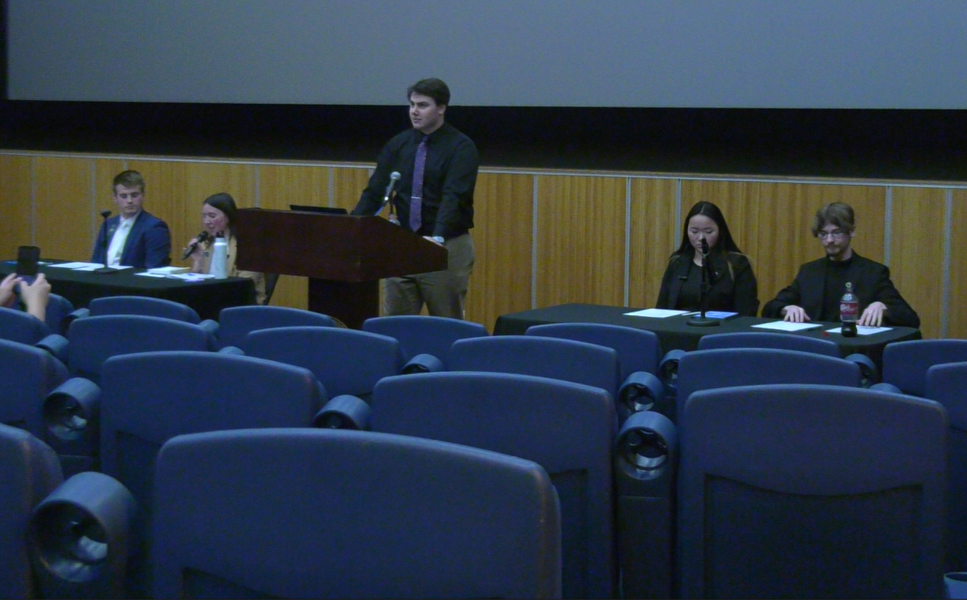Students and faculty gathered for the first two-ticket student presidential debate in four years. Current Vice President Sam Consiglio and University Activities Director Zach Jacobson are running against Intergovernmental Affairs Director Mei Bean and Academic Affairs Director Colin Rafter.
The April 10 debate was moderated by Parliamentarian Luke Mandli, who laid out the rules for the afternoon. Each candidate introduced themselves before the questions began. For every question asked, each ticket gave a one-minute response, leaving room for a one-minute rebuttal and a 30-second response afterwards.
The debate began with opening statements from the Consiglio Jacobson ticket. Consiglio explained her experience, as vice president and a senator. She discussed how they hope to “help enhance student resources” and “guide students to where they want to be.”
The Bean Rafter ticket discussed the significance of “visibility” and said they wanted to uplift voices of students of color without tokenizing them.
“I’m not doing this because I want the title of president. I’m doing this to be a beacon of hope for students who are about to give up on higher education,” Bean said. “I am doing this for the future of our campus.”
The two parties overviewed their foundations, and what they are running on. Consiglio defined goals as “creating campus community.”
“Our goal would be to translate this back into the student body in order to make sure there’s a welcoming, engaging and inclusive place on campus,” Consiglio said.
One argument continuously brought up was experience. Consiglio discussed her role as vice president while Bean described her efforts as IGA director.
Questioning ranged from how they plan to work with administration, how segregated fees encourage equity and inclusivity, housing on and off campus, getting students involved in conversations and how to work with the board of regents.
The Consiglio Jacobson ticket described their involvement in financial issues, as Consiglio has served part of the financial commission all three years of her college experience.
One significant issue discussed was diversity, following the UW System Board of Regents’s deal with the state legislature to release employee pay raises and restructure equity, diversity and inclusion programs on system campuses.
One specific piece brought up by Bean was resolution 67-R-7, which showed support for transgender athletes and students after Wisconsin passed anti-trans athlete legislation.
Consiglio and Jacobson said community was their major running point. The two outlined how important student involvement is.
“One of our main pillars is ensuring that all of the spaces here on campus are welcoming, inclusive, and equitable for students. So Zach and I really want to be a resource for students to encourage policies that make these spaces accessible, inclusive and equitable,” Consiglio said.
Both tickets emphasized reaching students. After Mandli’s debate questions, the audience had an opportunity to also ask questions. One member of the audience asked how to make the senate more accessible for all students.
“The idea of the involvement gap. I think a lot of us at this university are super involved and then there are people at this university who are barely involved at all and so I think the important thing is to make sure that we’re reaching those communities who aren’t involved at all,” Jacobson said.
Both camps greatly valued student involvement, and in their closing remarks, both camps mentioned it.
“We need to ensure that we’re bringing voices to the table that aren’t currently there and having a full perspective on our Student Senate,” Consiglio said.
“We are two people. So, we’re reaching out to students and we will continue to reach out to students whether elected or not to hear about student issues, what students care about and how we can fix them realistically and thoroughly,” Rafter said.
Voting for the senate election will take place April 15-17.
Leick can be reached at [email protected].








